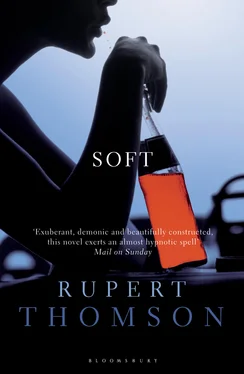Across the bridge and down on to Tooley Street, bleak and gleaming in the rain. Barker walked quickly, eager to be home. Just before he reached the entrance to The London Dungeon he turned right, into a tunnel that burrowed under the railway. Clinging to the curving walls were vents and cages fouled with grime and oil and dust. A steel roll-door lifted to reveal a mechanic wearing loose blue overalls, a car with two flat tyres. Barker passed an air-filter whose high-pitched howling set his teeth on edge. Then emerged into the daylight once again. It was summer, and his eyelids stung. The weather was humid, the sky yellow and light-grey, too bright, somehow, the green of the trees too pale. By the time he had climbed the stairs to the front door of his flat he was breathing hard.
He had been living there for almost five months and no trace of the squatters now remained. Thanks to Charlton’s aunt, who’d died recently, he now had proper furniture. ‘She didn’t have no diseases or nothing,’ Charlton said when Barker inspected her settee suspiciously. ‘She died of like, what’s it called, natural causes.’ He’d had a phone installed in the hallway. In the two main rooms he’d fitted pieces of red carpet, which had come from an office building that was being redecorated. On the walls in the lounge he had hung several pictures — shiny colours on a background of black velvet. He liked the subjects: chalets in the Swiss Alps, gypsy women, junks. He had also found one that had been made out of the wings of butterflies. A seascape, with islands. One day he would travel. Not like in the Merchant Navy, where you had to go where they told you to. Really travel.
Closing the front door behind him, he walked into the lounge. His dull silver weights looked sweaty. Christ, mate, what you got in there? As he lifted one and drew it automatically towards his chin, the phone rang. It was Ray Peacock.
‘Barker,’ Ray said, ‘I’m calling long distance.’
Behind Ray’s voice Barker could hear shrill laughter, the clink of glasses. Ray liked nothing better than to sit in some seedy south-coast cocktail bar and shout into his mobile. There would probably be a girl beside him. Short skirt, white high-heels. Someone he was trying to impress.
‘How did you get this number, Ray?’ Though, even as he asked, he knew.
‘That’s nice,’ Ray said, ‘after all I’ve done for you.’
Barker had been hoping he could leave Ray behind, along with almost everybody else in Plymouth, but Ray nurtured his connections, Ray let nothing go. Grasp Sparrow By The Tail.
Barker waited a few seconds. Then he said, ‘What do you want?’
‘I just thought I’d ring you up, see how you were —’
‘Bollocks.’ He’d spoken to Ray once before, in Charlton’s house on the Isle of Dogs, and he’d suspected even then that Ray was only phoning because he wanted to be punching buttons.
‘How long’s it been anyway? Six months?’
All of a sudden Barker didn’t like the feeling of the receiver in his hand. He felt as if he’d just eaten some seafood that was bad and in three hours’ time his stomach would swell and then, an hour later, he’d throw up.
‘Listen, Barker,’ and Ray’s voice tightened, ‘I heard about a job …’ The background noise had dropped away. He must have left the room where he’d been sitting. Walked out into a corridor. A car-park. He’d be pacing up and down like a caged animal. Like something in a zoo. Five paces, turn. Five paces, turn again. That’s what people do when they’re using mobile phones. They can’t stand still.
Barker closed his eyes and pinched the bridge of his nose, the scar tissue lumpy between his finger and thumb. Through the open window he could hear rain falling lightly on the trees. Beyond the rain, a siren.
‘This is big,’ Ray said in the same tight voice. ‘It could set you up.’
Still Barker didn’t say anything.
‘I had a chat with Charlton the other day,’ Ray went on. ‘He said you were skint.’
‘What is it?’ Barker said at last. ‘What’s the job?’
‘They wouldn’t tell me. You’ve got to meet someone.’ Ray dragged on a cigarette. ‘Must be big, though. There’s six grand in it.’
Six grand?
‘So why aren’t you doing it, Ray?’
‘That’s what I’m asking myself. Why aren’t I doing it?’
Barker laughed despite himself. He knew Ray wasn’t trying to be funny. It was just the way things came out. Ray used to have a girlfriend called Josie. A big girl — forearms the size of legs of lamb. One lunchtime Ray was sitting over his pint, scratching his head, when something fell out of his hair. Landed on the table, kind of bounced. Bright-red it was, shiny, slightly curved: a woman’s fingernail. Ray looked at it for a moment, then he looked up. Me and Josie. We had a fight this morning .
‘Seriously, though,’ Ray was saying, ‘you think I wouldn’t do it if I could? I mean, six grand. Jesus.’
‘So why can’t you?’
‘I’m out on bail. I can’t risk it.’
‘You’re a fucking menace, you are.’
‘Yeah.’ Ray sounded resigned. ‘Listen, you’ve got to help me out on this one. I’m counting on you.’
Barker stared at the blank wall above the phone. You shouldn’t ever let someone do you a favour. You shouldn’t get into that kind of debt.
‘Barker? You still there?’
‘I’m here.’
‘They’re going to phone you. Probably tonight.’
Barker couldn’t believe it. ‘You gave them my number?’
‘Well, yeah. I thought you needed the money.’
‘That’s great, Ray. That’s fucking great.’
‘How else are they going to phone you, for Christ’s sake?’
Barker stood in his narrow hallway with the receiver pressed against his ear. Tiny white-hot holes burned in front of his eyes. It wasn’t that Ray was stupid. No, he just saw things from a different angle, that was all. Barker could hear Ray’s voice raised in his own defence. I was only trying to help you, Barker. Thought I’d see you right. It’s not my fault . Ray was always only trying to help, and nothing was ever his fault.
When the phone rang again two hours later, Barker could have ignored it. Equally, he could have answered the phone and said he was unavailable; there were any number of excuses for not getting involved. And yet he had the sense that something was beginning, something that he was part of whether he liked it or not, something that couldn’t take place without him. Afterwards, he would remember his right hand reaching for the receiver as the decisive moment, the point of no return.
He listened carefully to the voice on the other end as it provided him with details of the meeting-place, a Lebanese restaurant near Marble Arch. No accent, no inflections; it might have been computer-generated to give nothing away. And the man’s face when he saw it, at one o’clock the next day, had the same lack of individuality. The man was sitting at a table in the corner with his back against a wall of shrubbery; lit by miniature green spotlights, the foliage looked rich and fleshy, almost supernatural. The man introduced himself as Lambert. It seemed an unlikely name. Barker took a seat. In the space between his knife and fork lay a pale-pink napkin arranged in the shape of a fan. He picked it up, unfolded it and spread it on his lap.
‘Thank you for coming,’ Lambert said.
They were the only people in the restaurant. Soothing music trickled from hidden speakers, instrumental versions of famous songs: ‘Tie a Yellow Ribbon Round the Old Oak Tree’, ‘Brown Girl in the Ring’, ‘The Green Green Grass of Home’. Barker noticed that there were colours in all the titles and he wondered if that was deliberate, if it had some kind of significance. Then he recognised the old Rod Stewart favourite, ‘Sailing’, and his theory collapsed. A waiter appeared at his elbow.
Читать дальше












